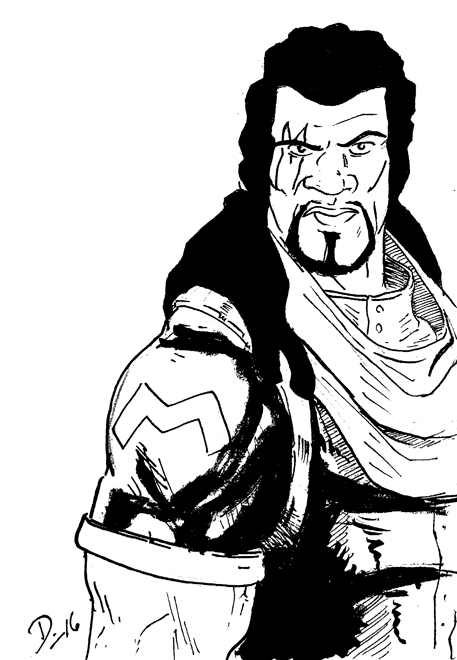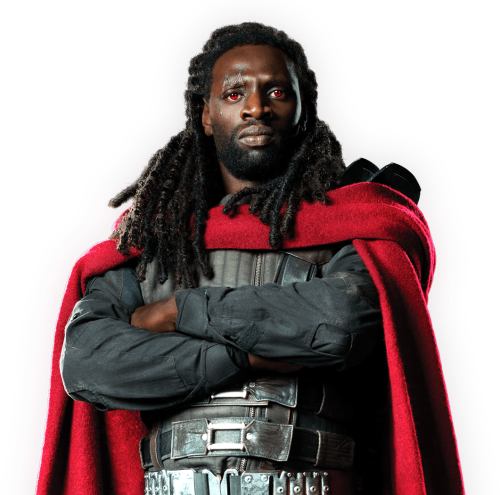Sketch Fridays #19 – Bishop
I’ve been thinking a lot about representation in comics recently, which wasn’t helped by the announcement of Finn Jones being cast in the role of Danny Rand in the upcoming Marvel Netflix series, Iron Fist––a story from the 1970s about a blue-eyed American kid who went with his family to a magical Asian village in the Oriental mountains and was trained in martial arts, only to return to America, see the level of crime rampant in his home country, and donned the mantle of the Iron Fist––Marvel’s pastiche of the popular-at-the-time kung fu movie craze.
Of course, it’s been forty years since that comic debuted, and as time progressed––along with social values and the announcement that Marvel was developing an Iron Fist Netflix show after the runaway hits of Daredevil and Jessica Jones––discussion surfaced about casting a more culturally appropriate actor for this show, which I don’t necessarily disagree with.
It’s a worthy discussion, but one I don’t have answers to, though I’m very eager to eavesdrop on its progression. But it made me think of characters that I came across before I became aware of the talk of diversity and tokenship. I was woefully ignorant, which has both positives and negatives––fully aware of my position of privilege as a straight, white male.
I got into comics fairly young––at 11 years old––with my purchase of X-Men #1. It was a year or so of severe change among the X franchise that saw new titles (with X-Men and X-Force being specific among them) and was charmed not by the obvious diversity among the cast, but by the ubiquitous sentiment shared by all of the characters––outcasts dealing with subjugation from “greater” society, ridicule and immediate judgment based on how they looked and what they were but, over which, they had no control. The diversity was simply assumed and immediately accepted.
With the introduction of X-Men #1, there was a consequent “reboot” in Uncanny X-Men (the original publication) #280 that, after two issues, introduced a new black character into the regular roster––Bishop––a mutant from the future hellbent on finding the bastard that sold the X-Men out and ruined the future, basically. He had it out for the cajun Gambit, and was as ornery and confrontational as the amnesiac (and Canadian) Wolverine (my favorite, whom I discussed earlier).
I was a devout X-Men reader, meaning that I only read X-Men and nothing else (no Uncanny, no X-Force, no X-Factor, even). I am, in hindsight, ashamed of my myopia. Despite that narrow-mindedness, Bishop showed up in X-Men at some point and I quickly accepted that he wasn’t lame (or else why would he appear in X-Men?). His mutant power is interesting. He absorbs energy and redirects it in powerful blasts to some poor victim’s face. While the nuance wasn’t explored during the time I followed the book, at least we got a cool guy with a big gun that could also shoot blasts of energy from his hands.
But his superpower is wonderfully reactive and metaphorical. I think it represents the ultimate fictional, superhero expression of the loner or outcast––the pre-judged––dealt with society. No matter the race or predilection, for many our statement was not a point of view as much as a reaction, absorbing the world as it washed over us and presenting it back in a concentrated and, with hope, a constructive form.
Though X-Men was my preferred comic at the time, there is no doubt that Uncanny X-Men was the more progressive book in a variety of ways. It’s a shame that Jim Lee––the Beatles of comic books in the early ’90s––went to the adjectiveless book, because he could have done even more for the medium had he stayed on Uncanny. At the very least, Bishop may have gotten more mainstream exposure and acceptance had Lee been behind the pencil (nothing against Whilce Portacio; he was a solid and talented road band against Lee’s rock star status, though). Bishop deserves it, being the perfect mutant for what I still believe is the perfect metaphor.




Discussion ¬